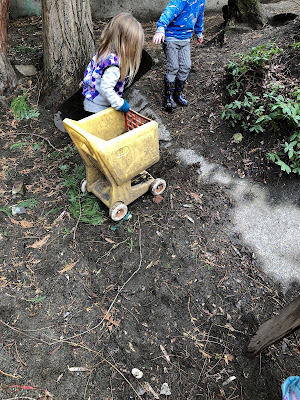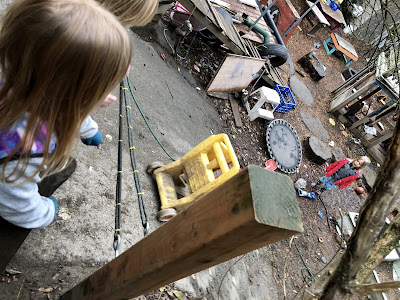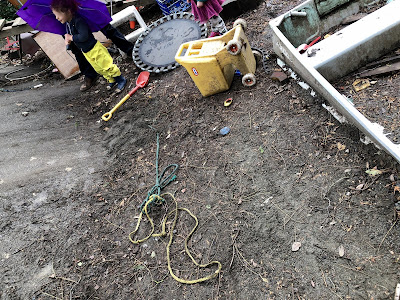We have a pair of wheel-less skateboards around our junkyard playground. One was found by the kindergarten class while on a neighborhood outing. The other was donated by a family with an excess of skateboards when the first one had an end snapped off during some rowdy play. Most days the skateboards are just used as planks of wood in the children's play, something with which to construct, say, a bad guy trap, but every now and then, someone will identify them for what they are and get the idea to ride them down
the concrete slide, the name we've given to a slope of concrete poured generations ago for the purpose of erosion control.
A pair of three-year-old girls were taking turns riding the skateboards down the slide when a friend wanted to join them. Not having access to a third skateboard, she opted for an old, plastic shopping cart. She could have whined about wanting her own skateboard or demanded a "turn," but chose to instead make do with an alternative of her own devising. That said, the idea of a kid trying to ride the plastic cart down the concrete slide was one that gave me cause for concern so I stepped a little closer.
She struggled to get the shopping cart up the hill and over the lilac roots on her own. The girl with the unbroken skateboard, without being asked, saw a friend in need and came to her aid. At first she tried to assist with just one hand, clutching her skateboard in the other, but soon realized it was a two-handed job, so put the skateboard on the ground. Working together, the girls wrestled the cart to the top of the slope.

Meanwhile, the third friend, the girl who had been using the broken skateboard, noticed the "better" skateboard on the ground, apparently abandoned. She dropped her board in favor of the upgrade, but before she could get far the original owner returned. "Hey!" she said firmly. "I'm still using that." There was a moment's hesitation, a balance point during which she had a choice to make. As often as not, this common preschool scenario descends into conflict, but in this case, she returned the skateboard without comment, retrieving her older, broken, less coveted one in its stead.

As this happened the girl with the cart had made her way to the top of the concrete slide. I was worried she planned to try to ride it down. I knew from experience that it would not go well: the slope is steep and hard, while the cart, especially with a kid in it, would be too top heavy to remain upright all the way to the bottom. Even with a helmet, it would be a hazardous attempt. Again, I moved closer, but whatever her original plan had been, by the time she was at the launching point, it became clear that she was going to let the cart fly solo, at least on its first run. Miraculously, the cart managed to make it to the bottom of the hill on its wheels before falling hard when it hit the dirt at the bottom.

The three girls looked at one another with wide eyes as the cart came to a stop at the bottom of the hill, two of them holding skateboards. The girl who had released the cart, then scooted down the concrete slide on her bottom, followed by the skateboard girls, one at a time, waiting for their friends to clear the way first. They huddled at the bottom of the slide, deciding to put the skateboards into the shopping cart, and all pushing together to get their equipment back to the top.
There were many opportunities for me to have stepped in, to assume the mantel of adult, to intervene, to fill their play with words of caution or compromise or rules or what passes for wisdom. I could have inserted myself into their game with blather about sharing or taking turns or "good jobs" or whatever else we too often feel driven to spew into children's play. But on this day, I didn't say a word and what I witnessed were three girls who didn't need me at all.
They repeated their game over and over until they were done: three girls, equals, getting their own needs met while helping their friends meet theirs, the very definition of a just and civil society.
No comments:
Post a Comment